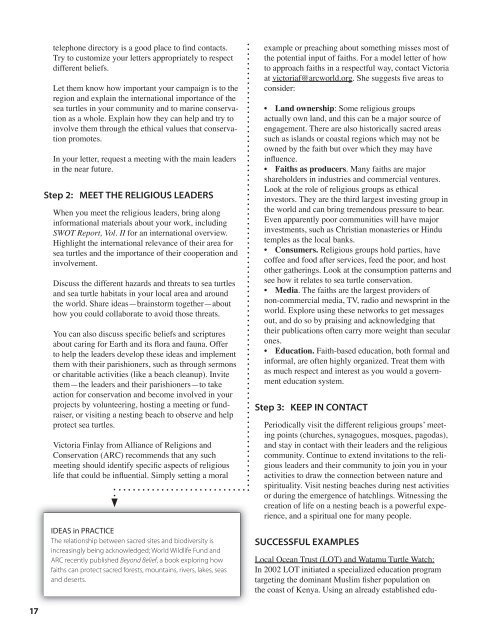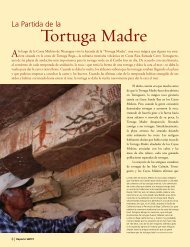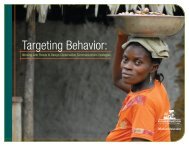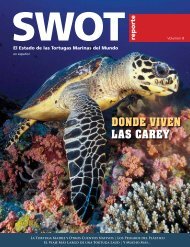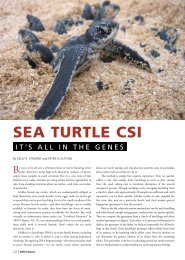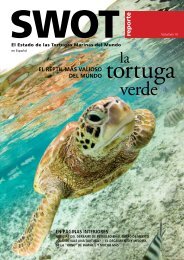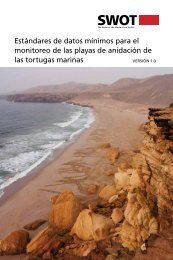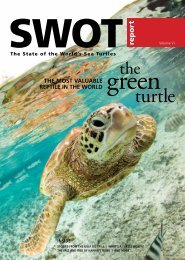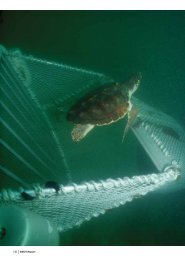SWOT Outreach Toolkit - The State of the World's Sea Turtles
SWOT Outreach Toolkit - The State of the World's Sea Turtles
SWOT Outreach Toolkit - The State of the World's Sea Turtles
You also want an ePaper? Increase the reach of your titles
YUMPU automatically turns print PDFs into web optimized ePapers that Google loves.
telephone directory is a good place to find contacts.<br />
Try to customize your letters appropriately to respect<br />
different beliefs.<br />
Let <strong>the</strong>m know how important your campaign is to <strong>the</strong><br />
region and explain <strong>the</strong> international importance <strong>of</strong> <strong>the</strong><br />
sea turtles in your community and to marine conservation<br />
as a whole. Explain how <strong>the</strong>y can help and try to<br />
involve <strong>the</strong>m through <strong>the</strong> ethical values that conservation<br />
promotes.<br />
In your letter, request a meeting with <strong>the</strong> main leaders<br />
in <strong>the</strong> near future.<br />
Step 2: MEET THE RELIGIOUS LEADERS<br />
When you meet <strong>the</strong> religious leaders, bring along<br />
informational materials about your work, including<br />
<strong>SWOT</strong> Report, Vol. II for an international overview.<br />
Highlight <strong>the</strong> international relevance <strong>of</strong> <strong>the</strong>ir area for<br />
sea turtles and <strong>the</strong> importance <strong>of</strong> <strong>the</strong>ir cooperation and<br />
involvement.<br />
Discuss <strong>the</strong> different hazards and threats to sea turtles<br />
and sea turtle habitats in your local area and around<br />
<strong>the</strong> world. Share ideas—brainstorm toge<strong>the</strong>r—about<br />
how you could collaborate to avoid those threats.<br />
You can also discuss specific beliefs and scriptures<br />
about caring for Earth and its flora and fauna. Offer<br />
to help <strong>the</strong> leaders develop <strong>the</strong>se ideas and implement<br />
<strong>the</strong>m with <strong>the</strong>ir parishioners, such as through sermons<br />
or charitable activities (like a beach cleanup). Invite<br />
<strong>the</strong>m—<strong>the</strong> leaders and <strong>the</strong>ir parishioners—to take<br />
action for conservation and become involved in your<br />
projects by volunteering, hosting a meeting or fundraiser,<br />
or visiting a nesting beach to observe and help<br />
protect sea turtles.<br />
Victoria Finlay from Alliance <strong>of</strong> Religions and<br />
Conservation (ARC) recommends that any such<br />
meeting should identify specific aspects <strong>of</strong> religious<br />
life that could be influential. Simply setting a moral<br />
IDEAS in PRACTICE<br />
<strong>The</strong> relationship between sacred sites and biodiversity is<br />
increasingly being acknowledged; World Wildlife Fund and<br />
ARC recently published Beyond Belief, a book exploring how<br />
faiths can protect sacred forests, mountains, rivers, lakes, seas<br />
and deserts.<br />
example or preaching about something misses most <strong>of</strong><br />
<strong>the</strong> potential input <strong>of</strong> faiths. For a model letter <strong>of</strong> how<br />
to approach faiths in a respectful way, contact Victoria<br />
at victoriaf@arcworld.org. She suggests five areas to<br />
consider:<br />
• Land ownership: Some religious groups<br />
actually own land, and this can be a major source <strong>of</strong><br />
engagement. <strong>The</strong>re are also historically sacred areas<br />
such as islands or coastal regions which may not be<br />
owned by <strong>the</strong> faith but over which <strong>the</strong>y may have<br />
influence.<br />
• Faiths as producers. Many faiths are major<br />
shareholders in industries and commercial ventures.<br />
Look at <strong>the</strong> role <strong>of</strong> religious groups as ethical<br />
investors. <strong>The</strong>y are <strong>the</strong> third largest investing group in<br />
<strong>the</strong> world and can bring tremendous pressure to bear.<br />
Even apparently poor communities will have major<br />
investments, such as Christian monasteries or Hindu<br />
temples as <strong>the</strong> local banks.<br />
• Consumers. Religious groups hold parties, have<br />
c<strong>of</strong>fee and food after services, feed <strong>the</strong> poor, and host<br />
o<strong>the</strong>r ga<strong>the</strong>rings. Look at <strong>the</strong> consumption patterns and<br />
see how it relates to sea turtle conservation.<br />
• Media. <strong>The</strong> faiths are <strong>the</strong> largest providers <strong>of</strong><br />
non-commercial media, TV, radio and newsprint in <strong>the</strong><br />
world. Explore using <strong>the</strong>se networks to get messages<br />
out, and do so by praising and acknowledging that<br />
<strong>the</strong>ir publications <strong>of</strong>ten carry more weight than secular<br />
ones.<br />
• Education. Faith-based education, both formal and<br />
informal, are <strong>of</strong>ten highly organized. Treat <strong>the</strong>m with<br />
as much respect and interest as you would a government<br />
education system.<br />
Step 3: KEEP IN CONTACT<br />
Periodically visit <strong>the</strong> different religious groups’ meeting<br />
points (churches, synagogues, mosques, pagodas),<br />
and stay in contact with <strong>the</strong>ir leaders and <strong>the</strong> religious<br />
community. Continue to extend invitations to <strong>the</strong> religious<br />
leaders and <strong>the</strong>ir community to join you in your<br />
activities to draw <strong>the</strong> connection between nature and<br />
spirituality. Visit nesting beaches during nest activities<br />
or during <strong>the</strong> emergence <strong>of</strong> hatchlings. Witnessing <strong>the</strong><br />
creation <strong>of</strong> life on a nesting beach is a powerful experience,<br />
and a spiritual one for many people.<br />
SUCCESSFUL EXAMPLES<br />
Local Ocean Trust (LOT) and Watamu Turtle Watch:<br />
In 2002 LOT initiated a specialized education program<br />
targeting <strong>the</strong> dominant Muslim fisher population on<br />
<strong>the</strong> coast <strong>of</strong> Kenya. Using an already established edu-<br />
17


